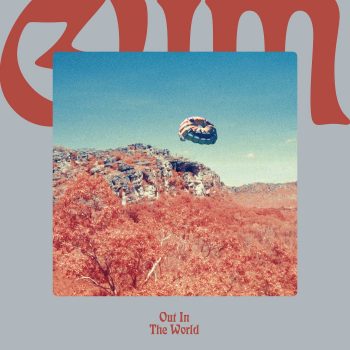GUM’s fifth solo album ‘Out in the World’ is, as a whole, indicative of the modern psychedelic now: Over-instrumentalized. That makes no sense, but bear with me and all will be clearer by the end of this ramble.
Stream: ‘Out in the World’ – GUM
GUM’s fifth solo album Out in the World is, as a whole, indicative of the modern psychedelic now; over-instrumentalized. That makes no sense yet, but bear with me, it will be clear by end of this ramble.
As a songwriting exercise, Jay Watson (dit GUM) exemplifies good bare bones structure.

However, there’s a case to be made that each hidden instrument is a vital protein waiting to be found by the scientific listener—each a key to understanding the organism’s functions—and considering that this long-player’s noise obfuscates the looking glass, the Petri dish becomes a task harder to decipher and enjoy beyond each piece’s immediate melodic pleasures.
To all the neo-psychers out there, if this is meant to be an auditory equivalent to a hidden picture phenomena, then I vacillate between saying it’s good because the elements are cached so well as to be indistinguishable or so bad in realizing there is no point to obscuring the better parts of the music in what is, essentially, a microcosmic slop.
The biggest criteria for any piece of psychedelic music is an epiphany beyond the eminence front. If psychedelic music is, as the name suggests, a mind-revealing genre, than what it reveals should be as big as it is elegant. Removed from its magic, the central melody or solo or instrumental break or even sample might sound cliché, but in the context of the piece or record it is inseparable and ineffable. Even artists such as Mogwai or Sonic Youth understood the point of a bridge or an instrumental break.
There has to be a moment for the extra instrumentation to silence itself for a key ingredient (or the key ingredient) to pronounce itself. It’s more than just a solo, and it doesn’t need to happen in the chorus. Prime examples in the context of a record include Kevin Parker’s bass riff off “The Less I Know The Better;” the acoustic break from Kurt Vile’s “Bassackwards;” John Paul Jone’s piano coda on “No Quarter;” Moby’s piano chime at the entrance of “Why Does My Heart Feel So Bad?;” Miles Davis swinging into scene for “So What?;” Eddie Hazel’s swoon over the bridge of “Good Thoughts, Bad Thoughts;” Chance the Rapper bearing “You were always perfect, and I was only practice” on “Same Drugs;” Fela Kuti taking the stage for “Lady,” Peter Green’s dissonant turn on “Under Way;” Buckingham’s reverberating solo over “Dreams;” Marvin Gaye’s scat over the break of “Inner City Blues (Make Me Wanna Holler).”
You may have noticed the above list is not even remotely relegated to the singular genre of neo-psychedelic rock and that’s exactly the point. Good psychedelic music is redundant. Good music is fundamentally psychedelic. No matter the instrument, the music works to reveal some observation on the human condition, objective or subjective and profundity relative, music is to crystallize a moment, a feeling or an idea beyond mere words.
Much of Watson’s newest pieces engage the listener as a visceral affair, taking a wham-bam-thank-you-ma’am approach and toll on the listener. When it’s all a parade of distorted horns, synthesizers on end and guitars played inside out, the songs have less chance to imprint.
Aside from the taste of victory on the aptly titled “Thrill of Getting It Right,” it’s a bit harder to nail down where Watson is emotionally on this record, his lyrical content is both hard for hearing and vague on its central theme. Topically, he discusses self-image, loneliness, depression, political fatigue and so on. Ironically, for a very upbeat and maximal musicality, his lyrics take an opposite position.—one might conclude that this is a matter of compulsion, that his aim was simply to comment on where he was musically, in the throes of a post-Merriwether Post Pavilion sonic—and boiling it down to a surreal gloss on the weight of the modern world feels like a half-assed assessment.

“Low to Low,” a parade of a piece, switches from korgs to horns back to korgs back to horns back to korgs back to horns, et cetera, et cetera. Along with “Out in the World,” Watson visits multiple points on the triangular spectrum betwixt the points of America, Talk Talk and the Flaming Lips. In terms of finishing a record, “You Make Your Own Luck” may work better as a denouement, but “Low to Low” leaves people wanting more of that progressive rock miasma. Even “Alphabet Soup,” using a vocal filter and syncopated rhythm similar to Stu Mackenzie on Polygondwanaland or Nonagon Infinity, dazzles with buzzing tape loops and an ascending-descending melody.
Thus Out in the World is a bit of a put-on, a successful gig if you’re the Flaming Lips or King Gizzard and the Lizard Wizard or Tame Impala, but not much Jay Watson’s game. Before his latest record, GUM felt like a different project altogether from Watson’s work with Pond. Out in the World draws very little distinction between it or Pond’s album The Weather and Tasmania. It’s one thing for a record to feel like it could have been made yesterday, but if it finds itself placed in a range — or just different points on the same arc, rather — then it has been dated.
And yet, despite all of my gripes, I still like the damn thing.
For casual listeners, this album is a lofty, multiple listen affair that might well dissipate interest with its — and I try desperately not to use this word — heady milieu. The songs will not much pop, but wear on listeners. To enjoy this record is to concentrate on the melodies that are discernible and to forget those which are not. The hook-fiends may be left for wanting, but the melodies that do exist power pieces from start to finish.
It’s the fourth solid record on the spot. Better than the rest, but still rooted firmly in neo-psychedelia; hardly transcendent. It’s not the record I hoped it would be, even if better than I expected.
I give it four years before psychedelic rock crafts a new sonic paradigm, hopefully. We’ve yet to see much worse.
— —
:: stream/purchase Out in the World here ::
— — — —

Connect to GUM on
Facebook, Twitter, Instagram
Discover new music on Atwood Magazine
? © Sam Kristofski
:: Stream GUM ::








